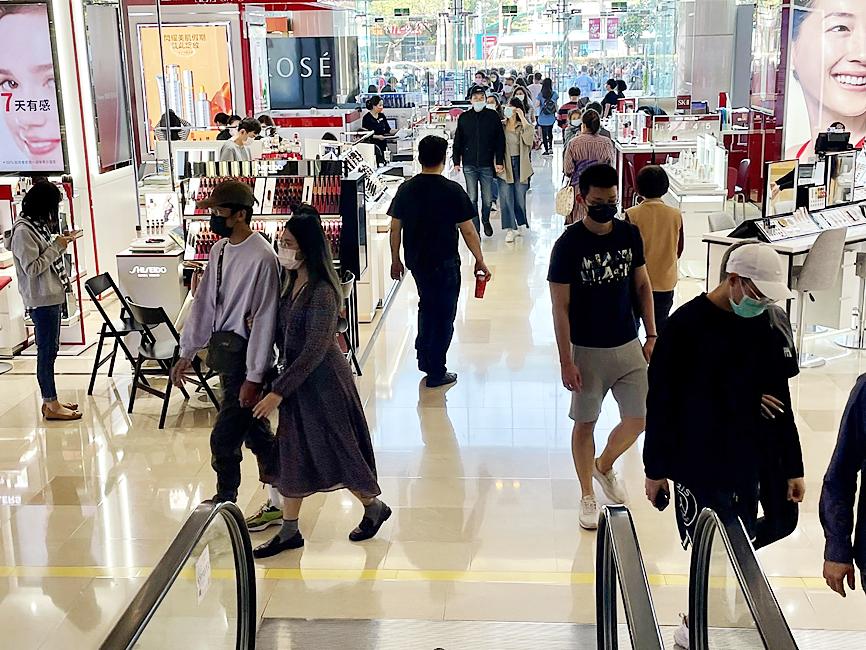The consumer confidence index this month gained 1.88 points to 76.52, its highest since March last year, as the economic situation improved at home and abroad, fueling inflation risks and concern over potential capital flight from equity markets, a National Central University survey released yesterday showed.
Spikes in raw material prices would eventually drive up inflation readings and prompt central banks worldwide to step in and tighten interest rates, said Dachrahn Wu (吳大任), director of the university’s Research Center for Taiwan Economic Development, which conducted the survey.
Changes in monetary policy, especially by the US Federal Reserve, would trigger capital flight from global bourses, Wu said, calling on investors to be cautious.

Photo: Tang Tsai-hsin, Taipei Times
Of the consumer confidence index’s sub-indices, the gauge on stock investment rose the most. It increased 5.4 points to 52.5, despite share price corrections among major tech firms, Wu said.
“Inflation risks pose a substantial challenge for policymakers worldwide this year,” Wu said, adding that the US producer price index rose significantly, heaping inflation pressure on consumer prices, which might hit the 2 percent alert level in the first half of this year.
The Fed would have no choice but to raise interest rates to keep inflation at bay, Wu said, adding that inflation risks could haunt Taiwan, as evidenced by escalating oil and iron ore prices.
Bank deposits would become attractive following interest rate hikes, he added.
The 10-year Treasury yield has already jumped above 1.6 percent, better than the dividend payouts most technology firms can offer, analysts have said.
The sub-index on the job market rose 4.2 points to 70.55, while the measure on economic outlook gained 1.55 points to 89.5, the monthly survey showed.
People also became more confident about household income moving forward, tipping the sub-index 1.3 points higher to 91.95, it said.
The sub-index on purchases of durable goods dropped 1.05 points to 111.6, as interest in real-estate properties remains healthy, the survey said.
Confidence scores of higher than 100 suggest optimism and values lower than the threshold indicate pessimism.
The reading on inflation expectations was 43, a fractional 0.15 point lower than one month earlier, meaning that the public is not concerned about price hikes, the survey said.
The survey polled 2,832 adults by telephone from March 18 to 21. It has a margin of error of 2 percentage points.

Taiwan Semiconductor Manufacturing Co (TSMC, 台積電) has secured three construction permits for its plan to build a state-of-the-art A14 wafer fab in Taichung, and is likely to start construction soon, the Central Taiwan Science Park Bureau said yesterday. Speaking with CNA, Wang Chun-chieh (王俊傑), deputy director general of the science park bureau, said the world’s largest contract chipmaker has received three construction permits — one to build a fab to roll out sophisticated chips, another to build a central utility plant to provide water and electricity for the facility and the other to build three office buildings. With the three permits, TSMC

RUN IT BACK: A succesful first project working with hyperscalers to design chips encouraged MediaTek to start a second project, aiming to hit stride in 2028 MediaTek Inc (聯發科), the world’s biggest smartphone chip supplier, yesterday said it is engaging a second hyperscaler to help design artificial intelligence (AI) accelerators used in data centers following a similar project expected to generate revenue streams soon. The first AI accelerator project is to bring in US$1 billion revenue next year and several billion US dollars more in 2027, MediaTek chief executive officer Rick Tsai (蔡力行) told a virtual investor conference yesterday. The second AI accelerator project is expected to contribute to revenue beginning in 2028, Tsai said. MediaTek yesterday raised its revenue forecast for the global AI accelerator used

The DBS Foundation yesterday announced the launch of two flagship programs, “Silver Motion” and “Happier Caregiver, Healthier Seniors,” in partnership with CCILU Ltd, Hondao Senior Citizens’ Welfare Foundation and the Garden of Hope Foundation to help Taiwan face the challenges of a rapidly aging population. The foundation said it would invest S$4.91 million (US$3.8 million) over three years to foster inclusion and resilience in an aging society. “Aging may bring challenges, but it also brings opportunities. With many Asian markets rapidly becoming super-aged, the DBS Foundation is working with a regional ecosystem of like-minded partners across the private, public and people sectors

BREAKTHROUGH TECH: Powertech expects its fan-out PLP system to become mainstream, saying it can offer three-times greater production throughput Chip packaging service provider Powertech Technology Inc (力成科技) plans to more than double its capital expenditures next year to more than NT$40 billion (US$1.31 billion) as demand for its new panel-level packaging (PLP) technology, primarily used in chips for artificial intelligence (AI) applications, has greatly exceeded what it can supply. A significant portion of the budget, about US$1 billion, would be earmarked for fan-out PLP technology, Powertech told investors yesterday. Its heavy investment in fan-out PLP technology over the past 10 years is expected to bear fruit in 2027 after the technology enters volume production, it said, adding that the tech would